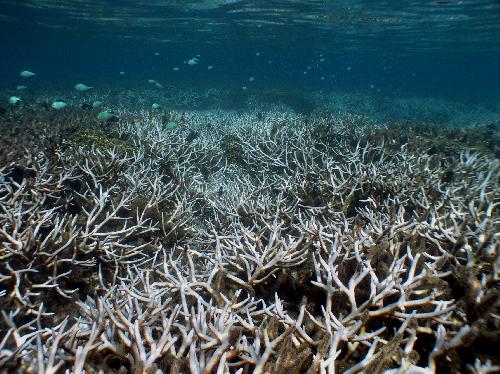Climate change rundown
Interview with
Climate change poses many, varied threats to the oceans. John Bruno gives us a rundown of findings from his recent review of the topic in the journal Science...
John - It's surprising how quickly this is all happening. I thought I would mostly spend my career warning people about the dangers of future climate change but it's happening so quickly that I'm actually witnessing it and probably will spend half my career studying it.
 Helen - So, what kind of changes are you seeing happening in the oceans?
Helen - So, what kind of changes are you seeing happening in the oceans?
John - We're seeing first very simple changes - animals simply dying when the water get too hot. Corals and many other animals have very specific thermal thresholds so they can only tolerate temperatures either too warm or too cold to a certain degree. If summer time water temperatures get about a degree Celsius, or a little bit more, warmer than as usual, that can kill corals. Then, of course, once the corals die, the rest of their reef really degrades because so many fish and invertebrates depend on the corals. But I think the really interesting thing from our review article was how many other more fundamental, but in a lot of ways less visible, changes are occurring as a result of climate change generally, and ocean warming in particular. So it's not as simple as "warming happens, animal dies". That's pretty simple and that's, I think, what scientists have been looking for and what the public probably expects.
But there are far more fundamental changes, for example in processes. So we know from experimental evidence that things like larval development and metabolism are very sensitive to temperature. It's a very difficult thing to actually measure in the field, but there are some related phenomena from this broader field of science called the metabolic theory of ecology that we are seeing. For example, plankton in the North Atlantic are getting smaller and that's exactly what the metabolic theory of ecology predicts. The warmer the temperature, the smaller the organisms, so we're seeing both phytoplankton - the small plants - to zooplankton - the animals that eat them - getting smaller and smaller. Part of that is selection for smaller individuals within the species and part of that is a replacement of larger-bodied species by smaller-bodied species.
Helen - And we're talking phytoplankton, we're talking changes there are going at the base of the foodweb which will presumably ripple all the way through the ecosystems.
John - That's right. Those changes might sound not so profound - okay, so phytoplankton gets smaller - but here's two really big implications. One is that it reduces the efficiency of what's called the "carbon pump". That is the rate at which the ocean ecosystem in the middle of the ocean extracts carbon dioxide and essentially moves it down into the deep water. That happens when phytoplankton die, they sink down to the bottom, and then that carbon in their bodies effectively gets stored for a long time. That's a really useful thing for us right now because it's mitigating some of the carbon dioxide that we're putting into the atmosphere.
There's another interesting implication for fisheries. The transfer of energy from one trophic level to another, for example from plant to herbivore or from herbivore to carnivore, is very inefficient: only about 10% of the energy from a plant for example makes it into the herbivore and that's true all the way up the food chain. So the smaller the plants are, you end up adding another trophic level to the food chain and what that does is reduces the biomass in productivity of the species that we're fishing. So, we're predicting that we're going to start seeing reduced production of the carnivores that we like to catch and eat.
Helen - Which of those things is worrying you the most?
John - I find that change in species distributions both worrying and also, frankly, quite interesting. We're seeing rapid range shifts of tropical and temperate species away from the equator into northern waters. There's really good evidence from long term monitoring projects that that's happening in the North Atlantic and it's true for phytoplankton and zooplankton, as well as for fish. So again, these tropical species are moving northward as the oceans warm. A study came out in the journal [Global Change Biology] by Fodrie et al. It's open access so anybody can go look for it. They had a time series of what fish were present in the Northern Gulf of Mexico in the 1970s and they went back to the same sites and used nets to catch all the fish to figure out what was there now. Really surprisingly, they found that there was about 15 new species that had moved north, primarily from the coral reefs in the Yucatan Peninsula and had invaded salt marsh and sea grass environments now in the Northern Gulf of Mexico. It's primarily due, we think, to the warming that they've seen there: about 5 to 7 degrees Fahrenheit, or 2 to 3 degrees Celsius, of warming over the last 30 years. It's a really interesting phenomenon because now a whole new suite of predators and herbivores are being exposed to prey species, both plants and fish, that have no evolutionary history with them. So there's really no co-evolutionary history between predator and prey.
Helen - So, warming oceans are already profoundly mixing up life in the sea as we know it. There's lots to think about there.
Find out more
John's Science review
Ove Hoegh-Guldberg & John F. Bruno (2010). Impact of climate change on the world's marine ecosystems. Science DOI: 10.1126/science.1189930
Bruno lab
Marine Ecology & Conservation in Carolina.
Fodrie et al (2010).
Climate-related, decadal-scale assemblage changes of seagrass-associated fishes in the northern Gulf of Mexico. (PDF) doi: 10.1111/j.1365-2486.2009.01889.x









Comments
Add a comment